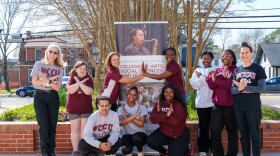It's the beginning of the Spring Semester and sorority and fraternity in-take season is about to begin on many college campuses. This has traditionally been an exciting time at historically black colleges and universities where many of these Greek organizations are turning 100 years old.
But entry into these close-knit groups have sparked major out-cry because of hazing. And administrators say the sometimes violent and mentally taxing pledge process has spilled over into other campus groups, like the band, sports teams and even honor societies.
Earlier this week, four historically black universities in North Carolina took part in a video conference titled "Hazing Hurts" to help address the problem. Leoneda Inge reports.
Leoneda Inge: One of the schools taking part in the "Hazing Hurts" video conference was North Carolina Central University in Durham.
This is N-C Central's drum-line. They keep the beat for the university’s “Marching Sound Machine.” This is the drum-line entertaining a crowd of students at an Obama campaign rally early last year. Later in the Fall, the drum-line was accused of hazing, and was suspended for a short time and ordered to perform community service for violating the Student Code of Conduct.
But there have been other cases of hazing in the last couple of years that ended a lot worse. A drum major at Florida A&M University in Tallahassee died during a hazing ritual. And there have been several lawsuits filed - one in California where a U-C Berkeley student says she had to take a medical leave from school after being beaten or hazed by members of Zeta Phi Beta Sorority, Incorporated.
N-C Central, Fayetteville State, North Carolina A-and-T State and Winston-Salem State universities took part in the video conference. One of the participants from Fayetteville State set the ground rules.
Fayetteville State University Moderator: In basic laymen terms – respect each other, what happens here stays here, this is going to be Vegas here for tonight, and don’t snitch on anyone directly. Everyone understand that? Okay.
Students at N-C Central had to sign-in before participating in the forum. Turns out, students cannot join a sorority or fraternity these days without attending such a workshop.
Kevin Jones is Assistant Dean of Students at N-C Central. He says students need to understand the seriousness of hazing.
Kevin Jones: It could be one incident and it could be a loss of a life. And it could be more serious in one incident than it could in 20 of somebody asking somebody to wash a car or something like that. You know? What you’re trying to do is have people to have a different thought process about what it is that they are trying to accomplish so they don’t feel the need to carry out those behaviors.
Jones says in his year and a half at the university, he has gotten several hazing complaints, but nothing has warranted expelling a student from school or calling the police.
Jim Harper is Chairman of the History Department at N-C Central. He and Jones are members of Omega Psi Phi Fraternity Incorporated. Harper says when the "Devine Nine" black sororities and fraternities banned pledging, students took their rituals underground which he says has likely led to much abuse. Harper says universities will soon be unable and un-willing to afford these organizations on campus.
Jim Harper: As a result of so many hazing incidents insurance companies are charging higher for their rates, you know, to insure Greek letter organizations. If this continues and they keep paying out, it’s going to be a situation where all of the rates go up to the point where we are un-insurable. It’s just like having your regular car policy. If you keep having accidents, you’re going to be uninsured.
During one part of the video conference students broke into groups to decide if a role-play situation was considered hazing or not.
It went like this - three young men preparing to join a fraternity were told it was the organization's tradition for them to design bricks to honor the group's founders. And it had to be done by 7am in the morning. Turns out the three men’s schedules didn’t work out for them to get together to perform the task until 2am, leaving only a few hours to get the job done. Are the men being hazed?
Earl Monroe: I don’t believe it’s hazing just for the simple fact that they needed to get the bricks build.
Alex Jones: You should have known ahead of time before joining the organization that you wanted to join that it was a tradition that you had to do it.
Mike Jones: No, I agree with both of them. It’s not hazing you can always say no, you can always say no. And you knew what the tradition was, so I don’t think that’s hazing at all.
Earl Monroe, Alex Jones and Mike Jones may be right. Organizers didn’t have a set answer. But they don’t want students to be blinded by tradition when it comes to deciding what’s right and wrong.






